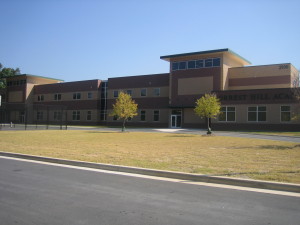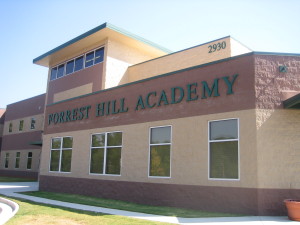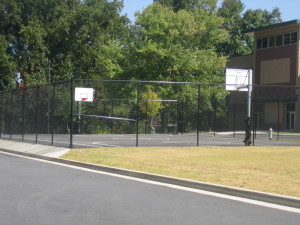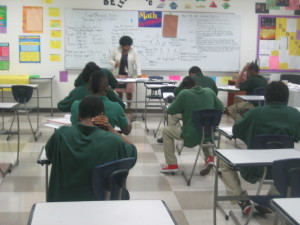APN Tours Controversial CEP School (UPDATE 1)
This report contains additional reporting by Matthew Cardinale, News Editor.
(APN) ATLANTA — As a lawsuit brought by the American Civil Liberties Union regarding a controversial alternative school in Atlanta, Forrest Hills Academy, continues to make its way through the court system, Atlanta Progressive News is one of few media outlets to be granted access to the school run by private firm, Community Education Partners.
(CORRECTION: A previous version of this article stated APN was the first news agency to tour the school. According to CEP, five other news agencies also toured the school back in March 2008. Atlanta Voice and CBS radio reported on their tours, according to Maynard Eaton, Political Editor for the Atlanta Voice.)
As previously reported by APN, the ACLU filed a class action lawsuit against Community Education Partners (CEP) and the Atlanta Independent School System (AISS) on March 11, 2008, alleging Atlanta’s privately run, tax-payer supported Forrest Hill Academy violates students’ constitutional right to an adequate public education.

Photos by Jonathan Springston
“AISS-CEP was designed as a privately-run, taxpayer-funded alternative middle and high school for students with behavioral problems. However, the placement process is often arbitrary and students who do not belong at AISS-CEP are given few meaningful opportunities to challenge compulsory assignment to the school,” the ACLU wrote in a press release.
APN toured the school for about two hours on September 30, 2008, and to be sure, CEP may have been on their best behavior when they knew they were being observed by a reporter. APN also interviewed the Principal and the District Liaison for AISS.
The tour provided by CEP included the entire campus, including all of the learning communities, or confined pods of students segregated by grade and sex; in addition to the front of the building with security areas, basketball court and a green area in front of the school, a counselor’s office, and various multipurpose rooms.
The school had no cafeteria because students eat in their pods. The school also has no gym or library.
Most of the students enrolled in the school were boys, rather than girls. Also the school enrolls mostly middle school students, rather than high schools, and does not accept 12th grade students.
The lawsuit alleges the school, which currently serves over 400 students in grades 6 through 11, is nothing more than a warehouse for minority students with academic and discipline issues.
Plaintiffs contend the school subjects students to unreasonable searches and fosters an environment where teachers do not teach and students do not learn.
“What kids tell us is [there is] a remarkable environment of chaos,” Emily Chiang, lead ACLU attorney in the case, told APN. “It seems as if almost everything can happen.”
The ACLU of Georgia, in working with CEP students and families in Atlanta, have identified issues which have been raised previously in other cities where CEP has operated and come under scrutiny.
Previously, the Houston Press reported in 2001 about several CEP students in Houston who complained to the news agency about being mistreated by teachers, disliking the prison-like environment, not learning anything, being bored from computer work, and for being sentenced to CEP by their previous schools for minor infractions like absences.
“CEP came in like gangbusters,” Dallas School Board member Lois Parrott told the Houston Press in 2001. “You get a big PR spiel and say your kids’ test scores are going to go up because the kids in the alternative school won’t be a part of your school.”
“The program continues to do a poor job of providing an adequate learning environment. Attending CEP… is having consequences on the students’ educational progress. The high cost of the program is not acceptable,” the Dallas Independent School District wrote in report REIS01-150-2.
CEP officials contend the Atlanta lawsuit is frivolous and accuse the ACLU of distorting the facts about what is really happening, although school officials did not directly address the lawsuit during the tour.
“When you aggressively seek out parents to find problems, when children have been assigned to a school such as this you can come up with somebody who wants to say something,” William Shepherd, District Liaison, said.
“Rome wasn’t built in a day,” Tricia Rock, the school’s new principal, told Atlanta Progressive News. “We still have areas of concern. Everyone’s a little keener, a little sharper with different things. We still have areas of improvement but [we’re] definitely trying to diminish a lot past experiences and learn from those and continue to grow.”
CEP officials contend those schools send students to Forrest Hill for academic help.
“Our piece is not to warehouse kids but to really get them back up to where they need to be and move them on to the next level,” Rock said.
Since taking the helm in August, Rock said she has made efforts to get students and parents more involved and make them feel comfortable about the school.
Rock held the first family night on September 17, 2008, and attracted about 150 people, including 75 parents, she said. The event featured various workshops that parents used to understand what is expected of students and how to be more involved in the process. Various service providers were also on hand to help students and parents develop coping skills, Rock said.
“We’re definitely on the pathway to make sure parents are more connected to what we do here,” Rock said.
She introduced a student government association this year and there could be a student ambassador program in the future, Rock said, “so students have more advocacy and student voices.”
Rock is looking for more recreation activities, like a flag football team for the middle school boys and wants to foster artistic achievement through a choir and talent shows.
“There’s so much talent that I’m sure as we expose our young people, there are probably so many hidden gifts that they have that’s something we’ll see blossom as we start that exposure process,” Rock said.
But Chiang said the ACLU is sticking to the stories their clients told them. “What we have heard has been consistent,” she said. “I believe the school is a very deeply troubled one. It is not in the interest of the taxpayers to pay money without accountability. The ACLU thinks the working people of Atlanta deserve more.”
U.S. District Court Judge Beverly Martin, Northern District of Georgia, dismissed four of ACLU’s claims on July 10, 2008, but refused to dismiss two others, after CEP made a motion to dismiss the entire suit. (CORRECTION: Previously this article stated the judge upheld the two claims, instead of refused to dismiss.)
“[Judge Martin] dismissed our claim under the Georgia State Constitution that the CEP school is providing a constitutionally inadequate education because we did not bring a claim before the local School Board tribunal pursuant to OCGA 20-2-1160,” Chiang said. “That statute requires every local school board to establish a tribunal to hear and determine ‘any matter of local controversy in reference to the construction or administration of the school law.'”
“We believed when we filed this case in a court of law instead that we were seeking relief that a school board tribunal could not provide – namely relief for all students at the school in the form of an injunction and/or declaration, and not just the release of one or two individual students from the school,” Chiang added.
According to both parties and a summary of the current status of the lawsuit prepared by CEP, the judge also ruled the ACLU could not sue CEP for not fulfilling its contract with Atlanta Public Schools because it is not a party to the contract.
The judge also dismissed a complaint that CEP did not follow appropriate disciplinary procedures because the law did not allow the ACLU to bring private action on the matter. She also dismissed a fourth claim claiming a violation of the Quality Basic Education Act under Georgia law.
But the judge did find legal merit in the ACLUs claim that CEP can be taken to court for alleged constitutional violations, despite being a private company.
“She refused to dismiss CEP even though it claimed not to be subject to the boundaries of the U.S. Constitution because it is a ‘private actor,'” Chiang said.
The judge also did not dismiss the ACLU’s claim about the denial of the right to be free from unreasonable searches.
Chiang said the case is in the discovery process regarding the two remaining claims and the ACLU is working to obtain relevant documents from CEP and Forrest Hill.
“What the defendants have done, they are doing their best to deny us documents,” Chiang said. “I don’t know if they are hiding something or trying to delay the case.”
Chiang said the ACLU filed a motion to compel school officials to turn over incident reports and disciplinary records, documents she called highly relevant and which the ACLU has not received.
CEP contends the ACLU has neither taken a tour of Forrest Hill Academy nor made any requests to do so despite the lawsuit.
Chiang countered that representatives from the Georgia ACLU had made several phone calls to Forrest Hill from September through November 2007 asking for a tour.
Those phone calls were never returned and the ACLU did not pursue the matter further, Chiang said. APN was able to obtain the tour after approaching CEP’s corporate office in Houston, rather than the local school board, months ago.
SECURITY
Still at issue is students’ constitutional right to be free from unreasonable searches. While Forrest Hill students are subjected to security checks each morning, the ACLU alleges students must lift their shirts above their heads.
APN arrived at the school after the security process had been completed but asked school officials about the process.
Boys and girls enter the school for security checks at separate entrances on opposite ends of the building. Male security screens boys while female security screens girls. Students are not forced to lift up their shirts, Rock said.
The CEP uses two search plans, which are described in detail on the CEP Web site.
“Each student receives a light search excluding the ‘Do Not Touch Areas,'” according to the description for “Student Search Plan 1.” “The areas searched include the arms, lower neck, waistline, legs, and lifting their feet to ensure there is no contraband in their socks. The light search is performed by same sex staff members and the search is completed to ensure weapons and drugs are not brought into the school.”
“Students remove their shoes and items in their pockets which are screened as completed in a typical airport screening process,” according to the description for “Student Search Plan 2.” “The student then passes through a metal detector. If the metal detector does not sound an alarm, the screening is completed and the student continues to class. If the metal detector does sound an alarm, the student receives an additional screening that includes a light search as would be completed in a typical airport screening process.”
The whole process takes 30 to 45 minutes, Rock said.
FORBIDDEN ITEMS
The ACLU claims the school considers watches, jewelry, purses, combs, brushes, keys, and money in excess of five dollars contraband. Girls are not permitted even to bring tampons into the building.
CEP claims those items are collected from students upon entry into the school and returned to the parents. Any health products, including tampons, are available at no cost through the school nurse.
Students are allowed to bring lunches from home but those lunches are collected from students in order to check for contraband, Rock said. Students receive those lunches when it is time for them to eat.
The ACLU is also concerned students are not allowed to bring in or take home any school supplies, including books. Students are provided all the materials they need, Rock said.
LACK OF GYM, LIBRARY, AND CAFETERIA
The lawsuit maintains Forrest Hill has no gym, cafeteria, or library.
Indeed, there is no gym but APN noted there is a basketball court and a green space in front of the school. Rock said students receive between 45 and 60 minutes of recreation time each day.
There is also no library or common cafeteria area; instead, the school is broken down into seven separate learning communities and the students eat in their “communities.”
These are labeled A through G and each has five classrooms. Students have 60 minutes in each of the five classrooms and rotate throughout the day.
One room contains computers with a software program called Plato that allows students to work at their own skill subset and measures growth in math and literacy, Rock said.
Contrary to accusations, students do not spend all day on computers, Rock said. This is the only class in which they do so.
Even if CEP’s claims are correct, it is unclear whether CEP altered its practices after previous complaints in other cities or after the recent ACLU lawsuit.
Each learning community has its own small area with two tables that students use to eat meals. Rock said students receive 25 minutes for lunch and there are several lunch periods between 11:00 a.m. and 1 p.m.
TEACHERS AND HOMEWORK
Another allegation is that teachers are unqualified and do not teach. The ACLU claims students fill out worksheets all day with little instruction or supervision.
Rock estimated about 60 percent of Forrest Hill teachers have five or more years experience while the rest have three years or less.
“Teaching is a calling, it’s not a job,” Rock said. “You have to have a passion to work with young people. We are not looking for warm bodies. We are looking for people who have a caring heart for kids first and foremost.”
“I’d rather have somebody that wants to be here, even if they were a first year teacher,” Shepherd said. “Often, when you have people that have been doing something different and they come here, this is just overwhelming for them. They might not do as well as we’d think with the experience that they have.”
As APN toured the school, it appeared teachers were teaching, giving students individual attention, and asking questions during a lecture.
At no time during the tour did APN see any students running wild. If students were in the halls, they were accompanied by at least one teacher.
Rock said the school has 19 teachers and 17 instructional assistants with two for every 17 students.
CEP does not assign homework, but students receive assignments with time at the end of each day to complete them rather than taking them home.
Teachers do this to make sure the work is completed and give students a chance to review the work with teachers to make sure students are on the right track, Rock said.
TEST SCORES AND GROWTH
This is the most glaring area for Forrest Hill and a point the ACLU uses as a club to hammer the CEP concept.
For the 2006-2007 school year, only 2.04 percent of 6th graders, 2.86 percent of 7th graders, and 5.73 percent of 8th graders met or exceeded Georgia standards in reading, math, science, and social studies as measured by the Criterion Referenced Competency Tests (CRCT).
These numbers are far below the rest of the Atlanta Public Schools district and the state. While it should be kept in mind that the school attracts students who tend to start with lower scores, the question remains how much CEP is doing to contribute to improvement among these students.
“A child might not measure up to what is expected on the CRCT but that same child might show two or three years of growth, which is worth recognizing,” Shepherd said. “The state standard is great, it’s fine, and we all want to be there but if we can’t get there, we want to continue to grow.”
The average Forrest Hill student entered the 2006-2007 school year reading and performing math at a 3rd grade level. Internal CEP numbers show some academic growth for the 2006-2007 school year over the previous two years.
Students enrolled 150 days or more averaged 3.2 years growth in reading and 4 years growth in math. Students enrolled less than 90 days averaged 2.2 years in reading and 2.8 years in math, CEP said.
However, CEP’s method for calculating its internal test scores has been criticized in the past. “If a sixth grader missed one question on the 3rd grade level but got all the questions right on the 4th, 5th, and 6th grade levels, CEP would classify him as being on the third grade level, because that was the first question he missed,” Bill McCloskey, Houston Independent School District director for alternative education told the Houston Press in 2001.
Middle school students enrolled for 150 plus days passed an average of 6.7 courses and high school students earned an average of 5 credits.
The average placement for all students in 2006-2007 was 109 days.
APN requested statistics for the 2007-2008 school year included test scores and how many students finished the program after how long, but that information was not immediately made available.
Chiang said the ACLU will continue to hold CEP and Forrest Hill responsible for their actions.
“The ACLU is deeply committed to ensuring that private companies like CEP receiving taxpayer money to perform essential government services are held accountable for their actions — particularly when they violate the constitutional rights of children in their care,” Chiang said.
“We were deeply gratified that [Judge Martin] not only upheld our core constitutional claims but also refused to let CEP off the hook,” Chiang said.
CORRECTIONS: This article corrects two points. First, as noted in the first and second paragraphs, a previous version of this article stated APN was the first news agency to tour the school. Local CEP officials had originally provided APN with the incorrect information. In fact, several agencies as noted above have toured the school, two of which reported on their tours.
Second, this article corrects the statement that the judge upheld some counts while dismissing others. In fact, the judge refused to dismiss two charges, but has not upheld the charges. This updated article adds additional information about which charges were dismissed and which ones were not.
About the author:
Jonathan Springston, Senior Staff Writer, is reachable is jonathan@atlantaprogressivenews.com
Revised syndication policy:
Our syndicaton policy was updated June 2007. For more information on how to syndicate Atlanta Progressive News content, please visit: http://www.atlantaprogressivenews.com/extras/syndicate.html



